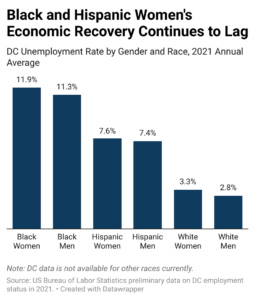
This Mother’s Day, DC Councilmembers have the opportunity to celebrate the District’s mothers, birthing parents, and caregivers through action. They can strengthen our care economy and fund programs that support mothers’ economic security—particularly for the Black and brown mothers who face intersecting systemic oppressions—in the budget that they will give preliminary approval to next Tuesday.
Black and Brown Mothers Face Systemic Barriers to Stability and Prosperity
Fifty-six percent of mothers in DC were the primary breadwinners in 2017, and another 26 percent shared that responsibility with a partner. Black and brown women are even more likely to be breadwinners—earning at least half of their total household income—than white women nationally, but they continue to be paid less due to systemic racism including a long history of stolen labor, exclusion and subjugation, and paternalistic policies.

That historic harm is reflected in Black and brown women’s overconcentration in under-paid work like early education, a lower likelihood of having jobs that offer benefits such as health care, and a higher likelihood to be behind on rent. In addition, the pandemic has been crushing for Black and brown women who faced the deepest job losses due to their overrepresentation in the sectors hardest hit by the recession, such as hospitality. In 2021, Black and Hispanic women in DC faced higher unemployment rates, on average, than their male counterparts and white women (Figure 1).
Historic and inclusive policies adopted over the last decade like paid leave, mandated sick days, free universal pre-kindergarten, and ending time limits for TANF cash assistance have pushed back on structural inequities. Yet, more progress is needed to achieve gender and racial economic justice.
DC Council Can Take Steps Now to Support Black and Brown Mothers in the Budget
The $19.5 billion spending plan for fiscal year (FY) 2023 should take further aim at longstanding gender inequities. The proposal includes some strong steps forward like an expansion of DC’s paid leave program to provide up to 12 weeks of paid leave and up to two weeks of prenatal leave. It also includes the nation’s first publicly funded compensation program that puts the wages of early educators in child care settings on par with those of public school teachers. This means a significant income boost to a workforce dominated by Black and brown women whose median earnings are just over the minimum wage—far less than their skills and credentials deserve. The proposal also supports mothers’ health by funding a Black maternal health taskforce, home visiting programs, and expansions of family health support programs like HealthySteps.
Council still has time to build on these investments and ensure that some of the most excluded mothers have the income, housing, and health supports they need to make ends meet. For the mothers trying to make a dollar out of 15 cents, the DC Council can honor them by:
- Expanding DC’s Earned Income Tax Credit (EITC) to workers who are undocumented. The DC EITC is a powerful income boost that advances racial, gender, and economic equity. This expansion would ensure workers with low incomes—especially the women who are disproportionately engaged in low wage work—can receive the credit despite their immigration status.
- Funding cash relief for workers excluded from unemployment and other assistance. Workers who are undocumented, returning citizens, and those in the informal cash economy have fallen behind without the supports other workers received during the pandemic. Modest cash aid would help some of the most vulnerable Black and brown women pay down debt and afford basic needs such as medicine.
- Extending Rapid ReHousing for families at risk of eviction or move them to permanent subsidies. Most families participating in Rapid ReHousing are headed by Black mothers, and failure to extend housing assistance to those facing the time-limit would likely lead to eviction, displacement, or homelessness for 90 percent of them.
- Providing $285.1 million more for rental assistance. Rental assistance increases housing and economic stability, particularly for Black women who remain the likeliest to be behind on rent and have long been at the highest risk of eviction nationally.
- Including health benefits in the early education compensation program. The Council-approved Birth to Three for All Act calls for pay parity for early educators—mostly Black and brown women—across the child care and public school sectors, including access to health care. The proposed budget allows excess compensation program funding to subsidize health insurance, but it is unlikely excess funding will cover the expense and a more robust plan is needed.
Funding these programs would take another step to dismantling the intersecting oppressions that Black and brown mothers face and put the District on a path to shared abundance.
